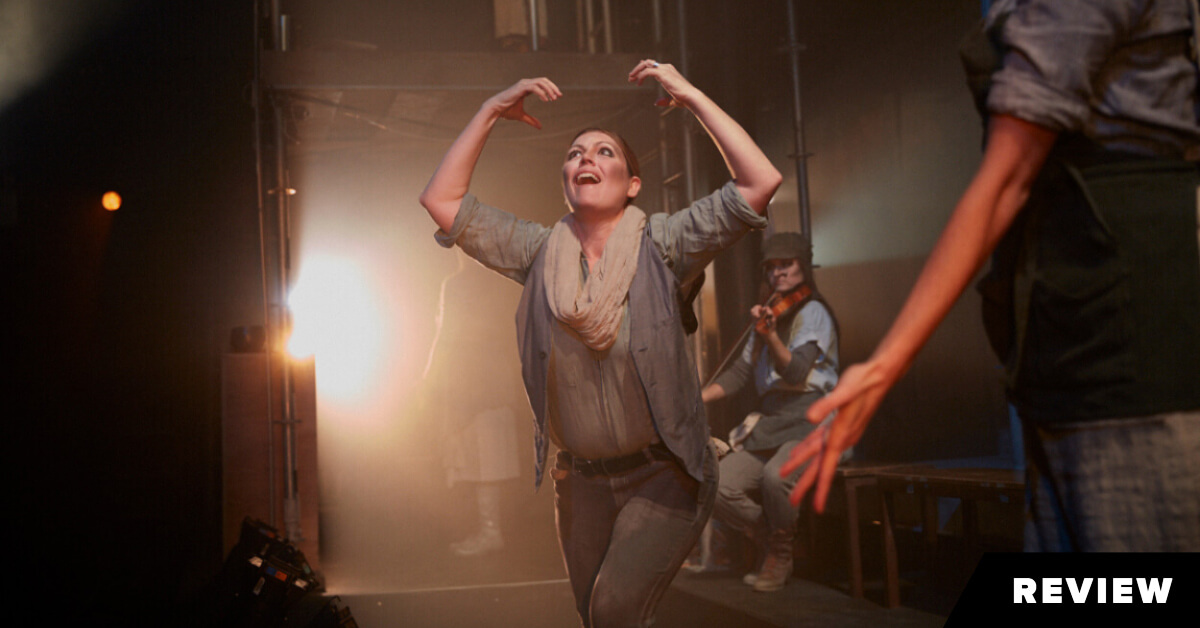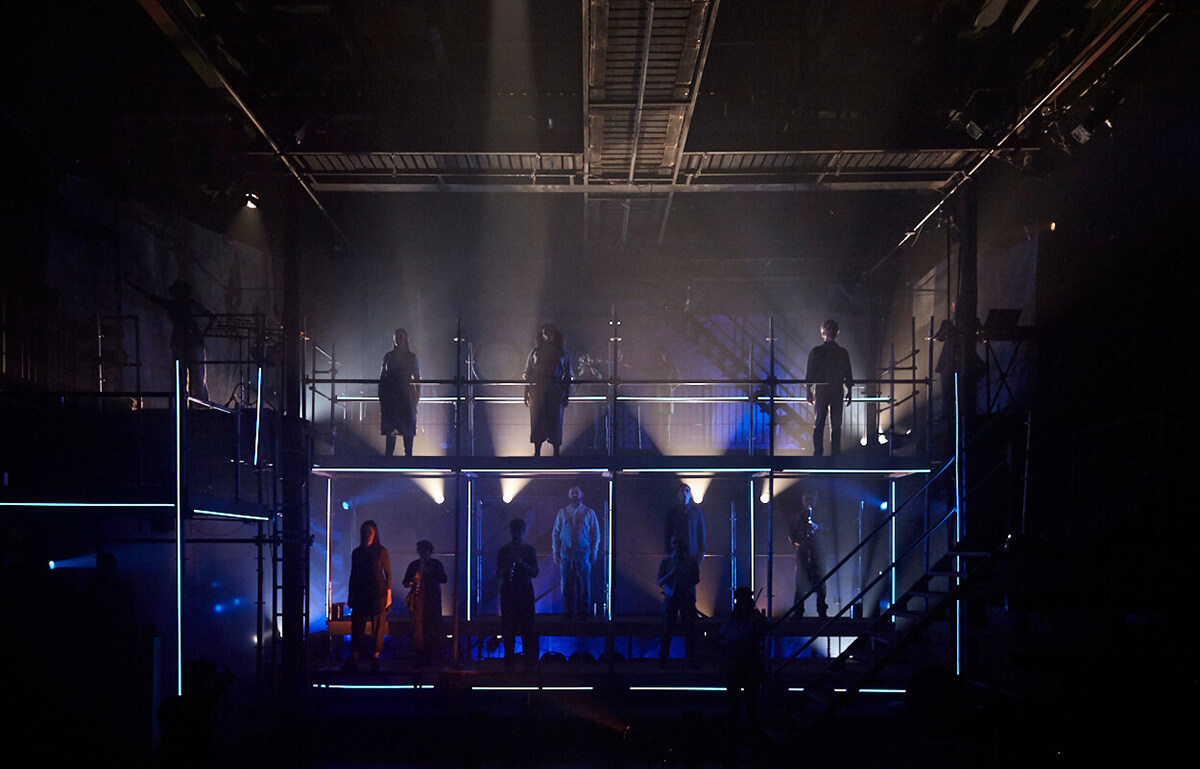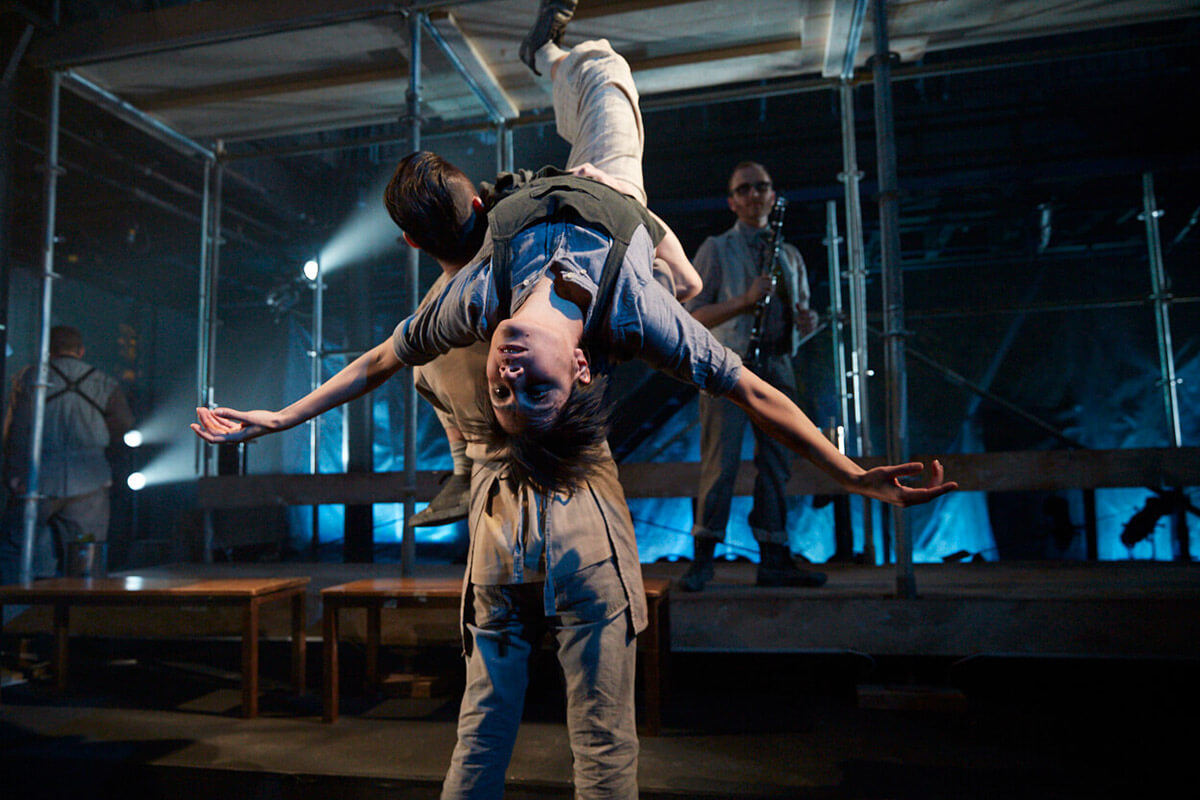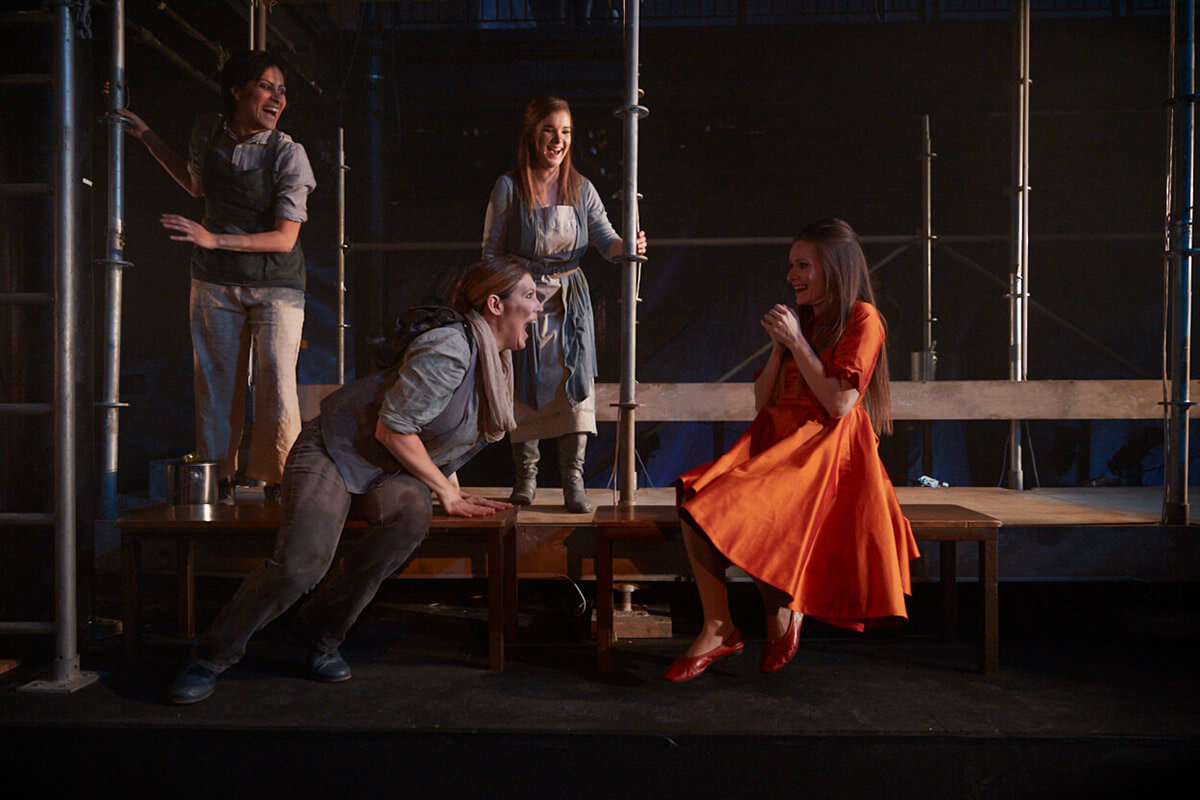
Against the Grain Theatre/Kopernikus, libretto and score by Claude Vivier, conducted by Topher Mokrzewski, directed by Joel Ivany, Theatre Passe Muraille Mainspace, Apr. 4 to 13. Tickets available at Arts Box Office 416-504-7529 or online.
At a certain point during the performance of Claude Vivier’s opera Kopernikus (1980), I just wanted all the restless movement on the stage to stop, so I could please listen to the music. If ever there was a production where the stage picture bears no relation to the libretto, it is this. The musical forces, however, are outstanding.
The late Montreal-born composer had a conflicted personality. On one hand, he was intensely spiritual, always searching for enlightenment, and many of his forty-nine works contain music and subject matter of sublime mystery. On the other, he was a gay man who preferred rough trade, which is what got him killed. In 1983, he was found strangled in his Paris apartment after picking up a homeless teenager in a bar. Vivier was just thirty-four. This chasm between the sacred and profane sides of his persona somehow makes Vivier’s violent death all the more cruel.
Vivier himself said of his only opera: “There is no story.” Rather, Kopernikus details the disjointed journey of the young girl Agni from death to a state of pure spirit. In fact, the subtitle of Kopernikus is Opéra-Rituel de Mort. Agni’s transcendence is told through a series of tableaux where she meets a parade of beings, both real or imagined, who are initiating her into the mysteries. These manifestations include Lewis Carroll, Merlin, Mozart, the Queen of the Night and Kopernikus. The opera is called Kopernikus as an homage to the astronomer who theorized that the earth revolves around the sun. To Vivier, Kopernikus was a “cosmic seeker”, and in the opera, it is he who completes Agni’s dematerialization.

Vivier’s opaque libretto is in French, German, and a language of his own invention. The opera is scored for seven singers and seven musicians. The singers perform individual characters and function as the chorus. All have strong voices, and include mezzo-soprano Danielle MacMillan as Agni, coloratura soprano Anne-Marie MacIntosh, soprano Jonelle Sills, mezzo-soprano Krisztina Szabó, baryton-martin Bruno Roy, baritone Dion Mazerolle, and bass Alain Coulombe. In short, Vivier covers the waterfront in terms of fachs.
The singers have to work hard in Kopernikus. Like many composers of new music, Vivier experimented with sound, and parts of this opera call for manually vibrating the lips, slapping cheeks, undulating up and down the scale, executing singspiel, sobbing, moaning, and declaiming in the sing-song voice from classical Chinese and Japanese theatre. In fact, at times there is a huge collision of sound as each person does his or her own thing. The glory of the opera, however, is in the ensemble of voices, lush with striking harmonies and counterpoint. Vivier was a modernist, so we are not getting melodies in a conventional sense. Instead, the score contains unusual patterns of sound leaning toward dissonance that speak of cosmic wonders. The opera is a dreamscape of the subconscious. It is a theatrical experience where you leave your reason at the door, and allow yourself to be cocooned in Vivier’s ethereal embrace.
The instrumental ensemble is very unusual – violin, oboe, three clarinets, trumpet and trombone, not to mention assorted gongs and chimes, and what’s more, the musicians are incorporated into the stage picture right along with the singers. The instruments are there more for musical effect and emphasis than accompaniment. Much of the score is made up of short, staccato blasts. The woodwinds and brass create a vigorous and forceful impact, yet, despite the fact that there really is no sweetness in the music, Vivier’s genius has crafted an other-worldly soundscape that pervades the imagination. Music director Topher Mokrzewski masterfully leads his forces on an avant-garde musical journey, and particularly, in the many choral passages, he finds Vivier’s celestial spheres.

Which brings us to Joel Ivany’s directorial vision. Jason Hand’s over-busy set is a giant scaffold with an upper and lower platform, and stairways and ladders in every direction. Marissa Kochanski’s inexplicable costumes have the singers and musicians dressed like factory workers in shades of grey and brown. At one point, three of them carry sacks of grain. Only Roy is dressed in more vibrant clothing as he is the narrator, so to speak. When Agni arrives, she is in an orange dress. Early on, however, she joins the workforce and disappears into the crowd. The opera is about her encounters with these figures from her dreams, yet she barely interacts with the other singers, literally becoming one of them. Instead, what we have are the singers and musicians ceaselessly moving up, down and all around the stage like some perpetual motion machine. It is mass confusion.
There are surtitles for the French and German lyrics, but not, of course, for Vivier’s imaginary language which is a good chunk of the libretto. Theoretically, we’re counting on the stage picture to help us understand what is happening. The libretto is very abstract and poetic, and only rarely, do the words give an outright reference to which of the dream people is speaking. I completely lost track of the characters, and quite frankly, I lost track of Agni. Some costume differentiation would have been useful or a character-directing surtitle.

Throughout the opera, the cast also engages in highly articulated hand and arm gestures choreographed by Matjash Mrozewski who is also listed as co-director. He is a talented choreographer who usually has something to say, but other than conveying ritual, these movement patterns seem empty. The two dancers in the cast, Anisa Tejpar and William Yong, are both well-known in Toronto’s dance world, but in this performance, they are lost as part of the crowd. Only in their duets, one denoting Tristan and Isolde, for example, do they stand out, although they are performing on a postage size platform and can scarcely partner each other.
On a brighter note, the musicians also engage in ritualized gestures, and are quite adept at manoeuvring their instruments in patterns like a military drill team. Again, there seems to be no rhyme or reason for their relentless travels. Only at the end does the staging finally make sense as the entire cast, with Agni bringing up the rear, ascends the staircase to the second level and disappears through a door. Thus, the dying notes of the opera happen offstage which is very effective.
The fact that the music works, and the staging does not take away from the importance of Ivany’s AtG’s staging Kopernikus. The opera has become a repertoire staple in Europe, and kudos to Ivany for bringing this iconic work home.
LUDWIG VAN TORONTO
Want more updates on classical music and opera news and reviews? Follow us on Facebook, Instagram or Twitter for all the latest.
- SCRUTINY | The Woman In Black Evokes Terror Without The Customary Digital Spectacle - December 10, 2025
- SCRUTINY | Performances And Dazzling Production Values Elevate Mirvish’s We Will Rock You - December 8, 2025
- SCRUTINY |Aszure Barton &Ambrose Akinmusire’s A a | a B : B E N D Offers A Powerful Merging Of Concert And Dance - December 5, 2025



